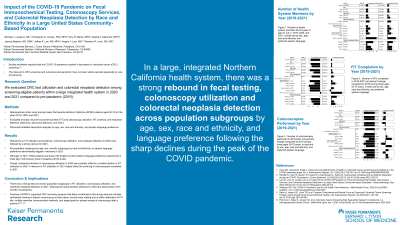Monday Poster Session
Category: Colorectal Cancer Prevention
P2144 - Impact of the COVID-19 Pandemic on Fecal Immunochemical Testing, Colonoscopy Services, and Colorectal Neoplasia Detection by Race and Ethnicity in a Large United States Community-Based Population
Monday, October 28, 2024
10:30 AM - 4:00 PM ET
Location: Exhibit Hall E

Has Audio

Michael J. Langevin, BS
Kaiser Permanente Bernard J. Tyson School of Medicine
Pasadena, CA
Presenting Author(s)
Michael J. Langevin, BS1, Christopher D. Jensen, PhD, MPH2, Jeffrey Lee, MD3, Theodore R. Levin, MD, MS, FACG4
1Kaiser Permanente Bernard J. Tyson School of Medicine, Pasadena, CA; 2Kaiser Permanente Northern California, Pleasanton, CA; 3Kaiser Permanente, Burlingame, CA; 4Kaiser Permanente, Pleasanton, CA
Introduction: Colonoscopy and fecal immunochemical test (FIT) screening for colorectal cancer (CRC) and CRC neoplasia detection sharply declined at the onset of the COVID-19 pandemic in 2020; however, the impact among racial and ethnic groups has not been widely reported. We evaluated CRC test utilization and neoplasia detection before and during the pandemic in a large integrated healthcare setting with a well-established organized CRC screening program based on annual FIT and opportunistic colonoscopy.
Methods: This retrospective cohort study evaluated FIT and colonoscopy utilization and CRC neoplasia detection by race and ethnicity among Kaiser Permanente Northern California (KPNC) health system members 50-75 years of age in 2019 (pre-pandemic) compared to 2020 and 2021 (pandemic years).
Results: The number of patients and their demographic characteristics were similar across study years. For individual racial and ethnic groups, compared to 2019, in 2020 there was a decrease in FITs completed (- 6% to -12%) and positive FITs (-10% to -24%). In 2021, all groups rebounded above their 2019 levels except the White (-3% for completed FITs, -2% for positive FITs) and Native Hawaiian or Other Pacific Islander groups (-4% for positive FITs). All groups decreased colonoscopy utilization from 2019 to 2020 (-16 to -32%), and the Black (-1%), Hispanic (-2%), and White groups (-8%) did not fully rebound in 2021. Compared to 2019, there was a decline in the number of patients with any adenoma detected in 2020 (-8% to -32%), with a rebound in 2021 beyond 2019 levels for all groups except the White group (-6%). Patients with an advanced adenoma detected declined from 2019 to 2020 (-5% to -34%), with a rebound beyond 2019 levels for all groups except the Black (-2%) and White groups (-6%). From 2019 to 2020, CRC cases increased in the Asian group (+3%) and declined in the Hispanic (-8%) and White groups (-3%). In 2021, compared to 2019, CRC cases were lower in the Black group (-3%), with no change in the Hispanic group, and were higher in the White group (+3%). All other groups had too few CRC cases to report percent changes.
Discussion: In a large integrated health system with a well-established organized CRC screening program, there was a decline in CRC screening utilization and neoplasia detection across racial and ethnic groups from 2019 to 2020, but all groups rebounded close to or beyond pre-pandemic levels in 2021.
Note: The table for this abstract can be viewed in the ePoster Gallery section of the ACG 2024 ePoster Site or in The American Journal of Gastroenterology's abstract supplement issue, both of which will be available starting October 27, 2024.
Disclosures:
Michael J. Langevin, BS1, Christopher D. Jensen, PhD, MPH2, Jeffrey Lee, MD3, Theodore R. Levin, MD, MS, FACG4. P2144 - Impact of the COVID-19 Pandemic on Fecal Immunochemical Testing, Colonoscopy Services, and Colorectal Neoplasia Detection by Race and Ethnicity in a Large United States Community-Based Population, ACG 2024 Annual Scientific Meeting Abstracts. Philadelphia, PA: American College of Gastroenterology.
1Kaiser Permanente Bernard J. Tyson School of Medicine, Pasadena, CA; 2Kaiser Permanente Northern California, Pleasanton, CA; 3Kaiser Permanente, Burlingame, CA; 4Kaiser Permanente, Pleasanton, CA
Introduction: Colonoscopy and fecal immunochemical test (FIT) screening for colorectal cancer (CRC) and CRC neoplasia detection sharply declined at the onset of the COVID-19 pandemic in 2020; however, the impact among racial and ethnic groups has not been widely reported. We evaluated CRC test utilization and neoplasia detection before and during the pandemic in a large integrated healthcare setting with a well-established organized CRC screening program based on annual FIT and opportunistic colonoscopy.
Methods: This retrospective cohort study evaluated FIT and colonoscopy utilization and CRC neoplasia detection by race and ethnicity among Kaiser Permanente Northern California (KPNC) health system members 50-75 years of age in 2019 (pre-pandemic) compared to 2020 and 2021 (pandemic years).
Results: The number of patients and their demographic characteristics were similar across study years. For individual racial and ethnic groups, compared to 2019, in 2020 there was a decrease in FITs completed (- 6% to -12%) and positive FITs (-10% to -24%). In 2021, all groups rebounded above their 2019 levels except the White (-3% for completed FITs, -2% for positive FITs) and Native Hawaiian or Other Pacific Islander groups (-4% for positive FITs). All groups decreased colonoscopy utilization from 2019 to 2020 (-16 to -32%), and the Black (-1%), Hispanic (-2%), and White groups (-8%) did not fully rebound in 2021. Compared to 2019, there was a decline in the number of patients with any adenoma detected in 2020 (-8% to -32%), with a rebound in 2021 beyond 2019 levels for all groups except the White group (-6%). Patients with an advanced adenoma detected declined from 2019 to 2020 (-5% to -34%), with a rebound beyond 2019 levels for all groups except the Black (-2%) and White groups (-6%). From 2019 to 2020, CRC cases increased in the Asian group (+3%) and declined in the Hispanic (-8%) and White groups (-3%). In 2021, compared to 2019, CRC cases were lower in the Black group (-3%), with no change in the Hispanic group, and were higher in the White group (+3%). All other groups had too few CRC cases to report percent changes.
Discussion: In a large integrated health system with a well-established organized CRC screening program, there was a decline in CRC screening utilization and neoplasia detection across racial and ethnic groups from 2019 to 2020, but all groups rebounded close to or beyond pre-pandemic levels in 2021.
Note: The table for this abstract can be viewed in the ePoster Gallery section of the ACG 2024 ePoster Site or in The American Journal of Gastroenterology's abstract supplement issue, both of which will be available starting October 27, 2024.
Disclosures:
Michael Langevin indicated no relevant financial relationships.
Christopher Jensen indicated no relevant financial relationships.
Jeffrey Lee indicated no relevant financial relationships.
Theodore Levin: Freenome, Inc – Grant/Research Support.
Michael J. Langevin, BS1, Christopher D. Jensen, PhD, MPH2, Jeffrey Lee, MD3, Theodore R. Levin, MD, MS, FACG4. P2144 - Impact of the COVID-19 Pandemic on Fecal Immunochemical Testing, Colonoscopy Services, and Colorectal Neoplasia Detection by Race and Ethnicity in a Large United States Community-Based Population, ACG 2024 Annual Scientific Meeting Abstracts. Philadelphia, PA: American College of Gastroenterology.
